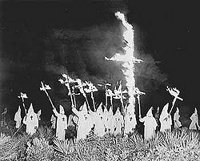Still, it could be worse.
I could be living in Egypt.1
Morsi? Morsy?
Egypt's President is محمد مرسى عيسى العياط, or Mohamed Morsi Isa El-Ayyat. I've seen his name spelled Morsi and Morsy. For now, I'm using "Morsi."My native language, English, uses the Latin alphabet, and I've discussed transliteration before. (October 22, 2011)
Moving on.
Playing the Class Card
One of the nice things about allowing folks with ability to earn more than average is that, when things get rough, you can blame them.Someone working for Egypt's president said that "blamed a small but powerful minority for the political upheaval." (CNN)
In my 'good old days,' it was the fault of 'pinko intellectuals' or 'bloated capitalists;' now it's the 'radical religious right,' or the 'liberal elite.' Tomayto, tomahto.
Expedient, Yes: Prudent, No
I acknowledge that when a leader starts facing the consequences of some unusually clueless move, it's easy to blame 'those people over there.' Sometimes passing the buck works: but I don't think it's the best idea. Not in the long run.I don't doubt that folks in Egypt who are professionals, entrepreneurs, or simply have access to more information than average, are the ones trying to keep their president from taking personal control of their country.
Unlike President Morsi, though: I think they're probably right.
Freedom and Stability
Maybe Egypt's president is right, and the only way to preserve freedom in Egypt is have troops arrest citizens who don't agree with the government. Maybe not.I'm guessing "not," but I could be wrong.
"Freedom" and "stability" sound good: and can describe worthy ideals.
But "freedom" doesn't mean "free to agree with me," or shouldn't; and "stability" shouldn't mean "keeping things just the way they are," or shouldn't.
Egypt and America
Minutiae of culture and language aside: I don't think folks in Egypt and America, or anywhere else, are all that unlike. Human nature, for good or ill, is - reliable:"Human nature will not change. In any future great national trial, compared to the men of this, we shall have as weak and as strong, as silly and as wise, as bad and as good."That said, all countries are not alike.
(Abraham Lincoln, Response to a serenade (November 10, 1864))
Wait a few decades, and one country often won't be 'alike.'
The America I grew up in was a place where someone could still believe that an "American" was someone with a nice English name, who either had English ancestors or who was desperately trying to pass for Anglo.
That changed in the last half-century. I like the new America, for the most part, but it's driving some folks nuts.
While writing this post, I looked up Egypt and America. The countries are similar in one or two ways. Both call the head honcho a "president," and both are republics. On the other hand, nobody's likely to get Egypt and the the United States confused:
- Egypt
- Ethnic groups (2006 census)
- Egyptian 99.6%
- Other 0.4%
- Language
- Arabic (official)
- English and French widely understood by educated classes
- Religion
- Muslim (mostly Sunni) 90%
- Coptic 9%
- Other Christian 1%
- Government
- Republic
- Ethnic groups (2006 census)
- United States
- Ethnic groups
- White 79.96%
- Black 12.85%
- Asian 4.43%
- Amerindian and Alaska native 0.97%
- Native Hawaiian and other Pacific islander 0.18%
- Two or more races 1.61% (July 2007 estimate)
- Hispanic
- Note: a separate listing for Hispanic is not included because the US Census Bureau considers Hispanic to mean persons of Spanish/Hispanic/Latino origin including those of Mexican, Cuban, Puerto Rican, Dominican Republic, Spanish, and Central or South American origin living in the US who may be of any race or ethnic group (white, black, Asian, etc.)
- Language (2000 census)
- English 82.1%
- Spanish 10.7%
- Other Indo-European 3.8%
- Asian and Pacific island 2.7%
- Other 0.7%
- note: Hawaiian is an official language in the state of Hawaii
- Religion (2007 est.)
- Protestant 51.3%
- Roman Catholic 23.9%
- Mormon 1.7%
- Other Christian 1.6%
- Jewish 1.7%
- Buddhist 0.7%
- Muslim 0.6%
- Other or unspecified 2.5%
- Unaffiliated 12.1%, none 4%
- Government
- Constitution-based federal republic
- Strong democratic tradition
- Constitution-based federal republic
- Ethnic groups
Related posts:
- Egypt
- "Business (not) as Usual in Egypt"
(December 9, 2012) - "Egypt, Morsi, and Dealing With Change"
(December 4, 2012) - "Egypt, America: Change, Freedom, and Other Threats to the Status Quo"
(November 23, 2012) - "Egypt: NGO Raids, Police, and Office Equipment"
(December 30, 2011) - "Incinerated Church, Dead Christians: But it Could be Worse"
(May 10, 2011)
- "Business (not) as Usual in Egypt"
- Fredom
- "Freedom for 'People of Any Faith or No Faith At All'"
A Catholic Citizen in America (November 9, 2012) - "Freedom, Fear, and the Internet"
A Catholic Citizen in America (September 28, 2012) - "Tolerance, Change, America, and the World"
(March 22, 2012) - "Freedom of Speech: Bothersome, but Valuable"
A Catholic Citizen in America (January 27, 2012) - "Religious Freedom, Niemöller, and Muslims in America"
A Catholic Citizen in America (April 7, 2011) - "DC Gun Ban, Online Censorship, Individual Rights, and Power to the People"
(June 27, 2008)
- "Freedom for 'People of Any Faith or No Faith At All'"
- "Egypt crisis: Morsi gives army arrest powers before vote"
(December ,10 2012) - "Egypt crisis: Morsi gives army arrest powers before vote"
(December ,10 2012) - "Egypt's opposition rejects constitutional referendum"
Reuters (December 9, 2012)
1 From the news:
"Egypt crisis: Morsi gives army arrest powers before vote"
(December ,10 2012)
"Egyptian President Mohammed Morsi has ordered the military to maintain security and protect state institutions in the run-up to a controversial referendum on a new constitution.
"The army has also been given the power to arrest civilians.
"Mr Morsi has tried to calm public anger by annulling a decree giving him huge powers, but rejected a call to scrap the 15 December constitutional vote.
"Opposition leaders called for protests on Tuesday against the referendum.
"The opposition was "not aiming at toppling the president" but wanted a better constitution, former Foreign Minister Amr Moussa told the BBC.
"Islamist groups have said they will hold counter demonstrations, raising fears of further bloody clashes on the streets of the Egyptian capital.
"In another apparent concession, the president suspended a big tax increase on the sale of a variety of goods including soft drinks, cigarettes and beer...."
"Top Morsy aide: Small, powerful minority behind Egypt's political upheaval"
Reza Sayah and Amir Ahmed, CNN (December 10, 2012)
"A top aide to Egyptian President Mohamed Morsy blamed a small but powerful minority for the political upheaval that has plagued the country ahead of a planned constitutional referendum.
"The statements are the latest in a volley of accusations between Morsy's supporters and opponents, and they highlight a political crisis that at times has spilled into the streets, prompting the president to deploy troops and tanks to protect government buildings.
" 'You have the majority of the poor people, the simple, definitely for the president and for the constitution,' Muhammad Rifaa al-Tahtawi, Morsy's chief of staff, told CNN on Sunday.
" 'You have a majority among the elite who are not for this constitution. Businessmen, media people. They are definitely a small minority, but powerful minority.'..."
"Egypt's opposition rejects constitutional referendum"
Reuters (December 9, 2012)
"Egypt's main opposition coalition rejected on Sunday Islamist President Mohamed Mursi's plan for a constitutional referendum this week, saying it risked dragging the country into 'violent confrontation'.
"Mursi's decision on Saturday to retract a decree awarding himself wide powers failed to placate opponents who accused him of plunging Egypt deeper into crisis by refusing to postpone the vote on a constitution shaped by Islamists.
" 'We are against this process from start to finish,' Hussein Abdel Ghani, spokesman of the National Salvation Front, told a news conference, calling for more street protests on Tuesday.
"The Front's main leaders - Nobel peace laureate Mohamed ElBaradei, former Foreign Minister Amr Moussa and leftist Hamdeen Sabahy - did not attend the event...."




